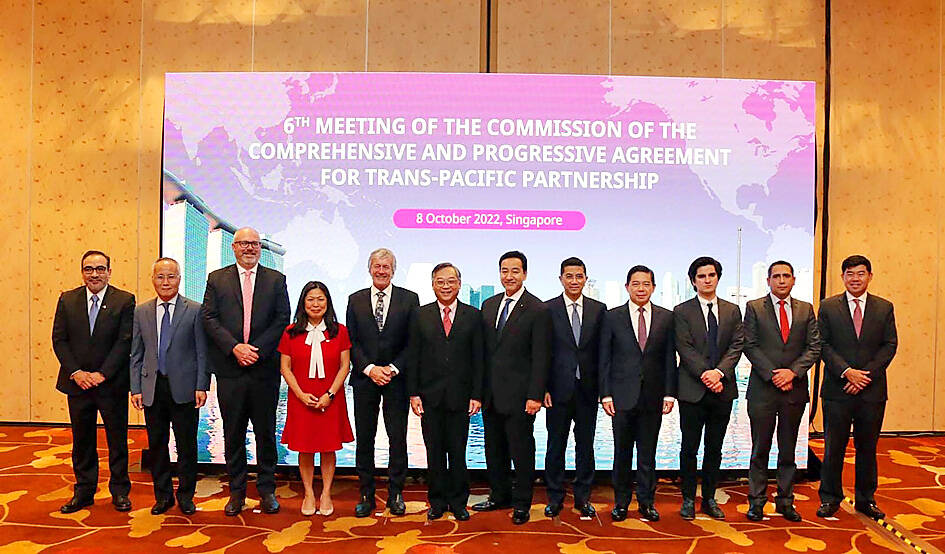Taiwan’s exports to nations belonging to the Comprehensive and Progressive Agreement for Trans-Pacific Partnership (CPTPP) expanded 23.8 percent in the first nine months of this year, while imports grew 14.9 percent, warranting Taiwan’s bid to join the free-trade bloc, data from the Directorate-General of Budget, Accounting, and Statistics (DGBAS) showed on Thursday last week.
The data was released one year after Taiwan announced its aim to join the CPTPP, which comprises 11 member states: Australia, Brunei, Canada, Chile, Japan, Malaysia, Mexico, New Zealand, Peru, Singapore and Vietnam.
The CPTPP’s members account for 13.4 percent of global GDP, at about US$13.5 trillion in total, making it one of the world’s largest free-trade areas, along with the North American Free Trade Agreement, the EU and the Regional Comprehensive Economic Partnership, the DGBAS said.

Photo courtesy of the Singaporean Ministry of Trade and Industry via CNA
DGBAS Statistics Department head Tsai Yu-tai (蔡鈺泰) said that Taiwan’s increase in trade with CPTPP member states had a lot to do with Taiwan benefitting from the contactless economy created by the COVID-19 pandemic.
That benefit is fading, explaining why exports lost momentum last quarter and might decline further this quarter and early next year, Tsai said.
Taiwan on Sept. 22 last year filed an official request to join the CPTPP and has made becoming a member its top policy priority, updating its fishing, medicine, investment, patent, trademark and intellectual property regulations to align with the trade body’s standards, the National Development Council has said.
CPTPP membership would positively affect local makers of textiles, garments, machinery and machine tools that remain heavily dependent on traditional manufacturing procedures and are sensitive to tariff changes, the Taiwan Institute of Economic Research (台灣經濟研究院) said.
As Taiwan’s textile products are relatively competitive in Asia, joining the CPTPP would boost that advantage, the Taipei-based think tank said.
While pursuing CPTPP membership, the government must not forget to boost relations with individual member economies, it said.
Exports last year to CPTPP markets soared 33 percent annually to US$94.99 billion, better than an average 9.3 percent increase over the previous five years, DGBAS data showed.
Shipments of electronics last year contributed US$41.32 billion, or 43.5 percent, followed by base metals and related products at US$8.31 billion, and information and communications technology products at US$7.8 billion, the DGBAS said.
Imports from CPTPP areas last year totaled US$108.61 billion, up 30 percent year-on-year, it said.
Electronics, mineral products and machinery were the top three import sectors, it said.

RUN IT BACK: A succesful first project working with hyperscalers to design chips encouraged MediaTek to start a second project, aiming to hit stride in 2028 MediaTek Inc (聯發科), the world’s biggest smartphone chip supplier, yesterday said it is engaging a second hyperscaler to help design artificial intelligence (AI) accelerators used in data centers following a similar project expected to generate revenue streams soon. The first AI accelerator project is to bring in US$1 billion revenue next year and several billion US dollars more in 2027, MediaTek chief executive officer Rick Tsai (蔡力行) told a virtual investor conference yesterday. The second AI accelerator project is expected to contribute to revenue beginning in 2028, Tsai said. MediaTek yesterday raised its revenue forecast for the global AI accelerator used

Taiwan Semiconductor Manufacturing Co (TSMC, 台積電) has secured three construction permits for its plan to build a state-of-the-art A14 wafer fab in Taichung, and is likely to start construction soon, the Central Taiwan Science Park Bureau said yesterday. Speaking with CNA, Wang Chun-chieh (王俊傑), deputy director general of the science park bureau, said the world’s largest contract chipmaker has received three construction permits — one to build a fab to roll out sophisticated chips, another to build a central utility plant to provide water and electricity for the facility and the other to build three office buildings. With the three permits, TSMC

TEMPORARY TRUCE: China has made concessions to ease rare earth trade controls, among others, while Washington holds fire on a 100% tariff on all Chinese goods China is effectively suspending implementation of additional export controls on rare earth metals and terminating investigations targeting US companies in the semiconductor supply chain, the White House announced. The White House on Saturday issued a fact sheet outlining some details of the trade pact agreed to earlier in the week by US President Donald Trump and Chinese President Xi Jinping (習近平) that aimed to ease tensions between the world’s two largest economies. Under the deal, China is to issue general licenses valid for exports of rare earths, gallium, germanium, antimony and graphite “for the benefit of US end users and their suppliers

Dutch chipmaker Nexperia BV’s China unit yesterday said that it had established sufficient inventories of finished goods and works-in-progress, and that its supply chain remained secure and stable after its parent halted wafer supplies. The Dutch company suspended supplies of wafers to its Chinese assembly plant a week ago, calling it “a direct consequence of the local management’s recent failure to comply with the agreed contractual payment terms,” Reuters reported on Friday last week. Its China unit called Nexperia’s suspension “unilateral” and “extremely irresponsible,” adding that the Dutch parent’s claim about contractual payment was “misleading and highly deceptive,” according to a statement